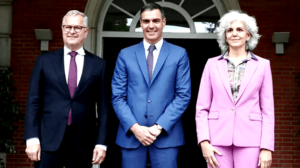Maersk has signed a framework protocol with the government of Spain on opportunities for large-scale green fuels production, taking advantage of the nation’s green energy potential and its proximity to core trade lanes.

If implemented in full, the plans in the protocol could deliver up to two million tonnes of green fuel per year, according to Maersk. Maersk need about six million tonnes of green methanol per year to reach its 2030 fleet emissions target, and much more by 2040, when it has pledged to achieve net zero.
“We are living in a climate emergency, and we need to rapidly accelerate the availability of green future fuels. We are very pleased to explore green fuel opportunities with the Spanish government, as the country holds key characteristics to help solve this challenge,” said Maersk CEO Soren Skou.
Maersk is considering green-energy opportunities in Andalusia and Galicia, which have abundant sunshine and wind (respectively). The agreement covers the full value chain, from renewable energy sources to bunkering. It an estimated potential to create up to 85,000 jobs, including construction and temporary positions.
Read Also: No Joy For Carriers As Spot Rates Look Set To Drop Below Pre-Pandemic Levels
According to El Progreso, the plan has an estimated investment value of up to $10 billion over the next eight years. It is rumored to center on the port of A Coruña, and could involve the construction or purchase of four gigawatts of electrical generating capacity for a vertically-integrated power-to-fuel supply chain.
“This project is perfectly aligned with Spain’s strategy of reindustrialization, just transition and the green hydrogen roadmap, advancing in the fulfillment of the common commitment of decarbonization of the European Union. It will also strengthen economic, political and commercial ties with Denmark, partner and a friend in EU,” said Spanish Prime Minister Pedro Sanchez.
The protocol is one of many agreements Maersk has arranged in a push to solve the biggest problem of the green transition in shipping – fuel supply. To operate the 19 methanol-powered vessels it has on order, the company needs about 750,000 tonnes a year within three years’ time. Since this supply does not currently exist, Maersk has signed seven different partnership agreements with future suppliers in order to help build the energy industry it needs.
Kindly like us on Facebook/twitter















